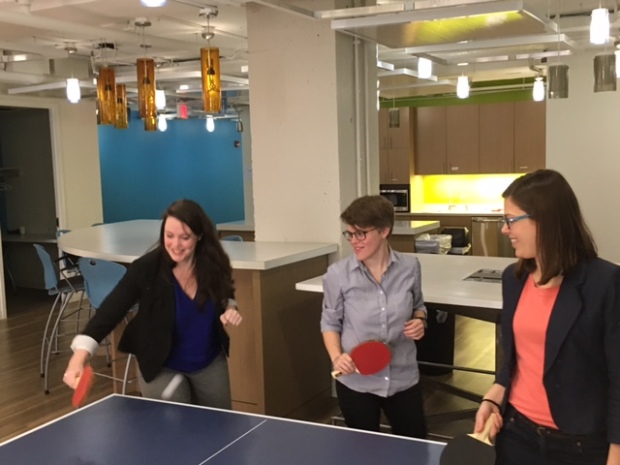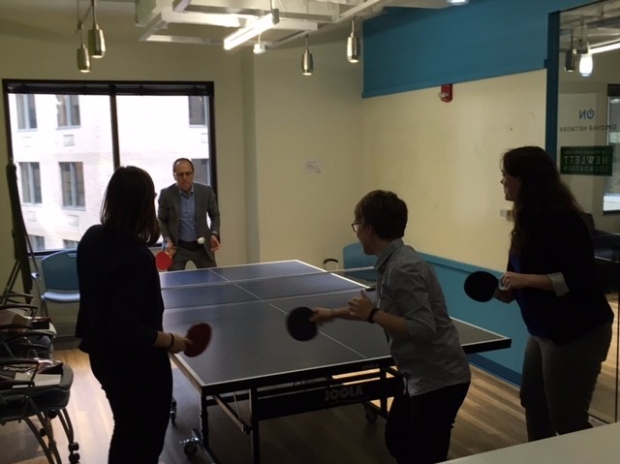We have found a new home! Kindly visit this link in our new website here: https://www.denver-frederick.com/2017/05/29/the-business-of-giving-visits-the-offices-of-feedback-labs/
Better Than Most is a regular feature of The Business of Giving examining the best places to work among social businesses and nonprofit organizations.
Denver: We have visited many organizations with thousands and thousands of employees and discussed issues of work culture with them. Most nonprofits, however, have just a few employees who are often asked to wear many hats. And this evening, you will visit one of the very best of that breed, Feedback Labs. We’ll start with Dennis Whittle, who was a guest on the show recently, and then hear from the other members of this lean and multi-talented staff.


Dennis: I’m pleased about several things about this team. One is that any of us—not just me, but any of us can be photocopying one moment and at the White House co-hosting a meeting the next moment. We can be at the World Bank, the White House, a major foundation, leading that meeting and then reassembling back here and preparing for the next one. And what I like best about the team is almost anybody on the team can interchangeably perform those functions. Many teams are very hierarchical where only the top person does it and everybody else serves him or her – that is not the way we operate.
Megan: So there’s still a culture of working hard, but I appreciate the role modeling of “You have other parts of your life. They’re important, too. It’s up to you to figure out how do you work hard and do what’s expected of you, which is a lot, but also figure out the rest of your life and have room for that.” So I appreciate that.
Meg: I think the culture of excellence that Megan touched on also relates to me of the way in which all of us on the Feedback Labs teams do relate to each other, and that the fact that there’s an expectation of excellence in all of the work that we do enables us to have high expectations for ourselves, which enables us as a team to support each other and cut each other some slack when that needs to happen.
And so I think there have been several examples of times when I know I will beat myself up over something I didn’t get in in time. Or if there’s something that I need some help and didn’t realize I was going to need the support that I did, where Sarah and Megan and Dennis and Jordan – everyone is willing to jump in and are able to do so very willingly and graciously without making me feel like I am slacking on that bit of excellence, that we all kind of hold ourselves to such high standards and we all know that each [other are] doing that. And because of that, we have this culture where we respect each other, we know the work is getting done and therefore we’re happy to jump in where we can. And that’s really, really meaningful to me because I know we’ve all had opportunities where we’ve needed that and it just happens without needing to ask for it, and that’s great.
Sarah: To reflect Dennis’ excellence point, we accomplish the work of a 50-person organization with a 4-person organization, and that’s just because we think we can and we go out and do it. And I’m really proud of that fact. But I also think that we are realistic and we take care of each other and that’s how we can continue to do the amount of work and the quality of work that we do.
And so we have the opportunity to be really small, really agile, and spend some of our time thinking really critically about the extra-curricular parts of our job. So whether it’s editing or whether it’s copying or whether it’s graphic design, who really likes to do that thing? How can we shift our work around so that our job is pleasurable and not only sort of effective? But I do think still that bringing your full self to work is critical when there’s only four of you because you don’t have time for interpersonal friction. You just have to kind of lay it on the table, deal with it and move past it.
Dennis: Part of the requirement is to create magic. And I say this quite often – we can’t succeed as a small team in changing the world if we don’t create magic for the people who come into contact with us. So we don’t even do all the work. A lot of people do the work with us. And they do the work with us because whenever they come into contact with Feedback Labs, they feel good. They feel that we are helping make them productive; that we are helping them project their values and the change that they want to see into the world. And so the experience that we create is one thing that I emphasize over and over, probably ad nauseam to everybody, but I’m really proud that the team, that all of us combined create a sense of magic, whether it be at the Summit or whether it be day-to-day work with the people that we come into contact with or with our 200 and some organizations that make part of the feedback network.
Megan: This drumbeat of interacting with the wider 200-plus organization network that really is Feedback Labs, I think keeps us asking: What do the people – the feedback champions who we’re here to support – what are they trying to do and how can we support them to do it? And then how do we bring magic to doing that?
I think the fact that our focus is always there and that we’re asking ourselves how do we do that with excellence, I think keeps us focused on the right thing.
Denver: I want to thank Dennis Whittle, the Executive Director of Feedback Labs and the other who participated in this piece: Sarah Hennessy, Megan Campbell and Meg VanDeusen. You can get this audio, transcript, and pictures just by visiting denverfrederick.wordpress.com.

The Business of Giving can be heard every Sunday evening between 6:00 p.m. and 7:00 p.m. Eastern on AM 970 The Answer in New York and on iHeartRadio. You can follow us @bizofgive on Twitter, @bizofgive on Instagram and at http://www.facebook.com/BusinessOfGiving



